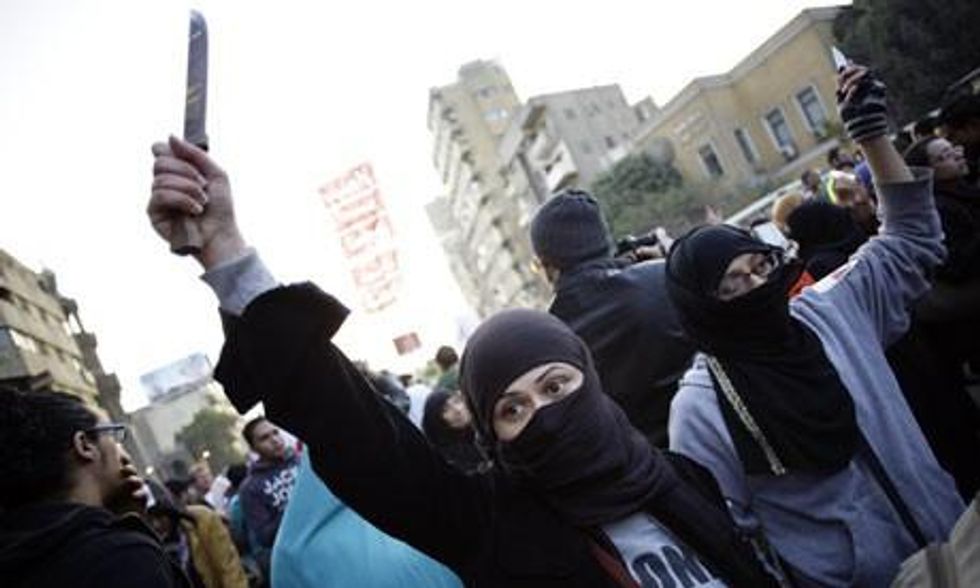'I'm sick of being ashamed." Three days ago, an anti-harassment activist said those words to me in a flat above Cairo's Tahrir square, as she pulled on her makeshift uniform ready to protect women on the protest lines from being raped in the street. Only days before, I'd heard exactly the same words from pro-choice organisers in Dublin, where I travelled to report on the feminist fight to legalise abortion in Ireland. I had thought that I was covering two separate stories - so why were two women from different countries and backgrounds repeating the same mantra against fear, and against shame?
From India to Ireland to Egypt, women are on the streets, on the airwaves, on the internet, getting organised and getting angry. They're co-ordinating in their communities to combat sexual violence and taking a stand against archaic sexist legislation; they're challenging harassment and rape culture. Across the world, women who are sick and tired of shame and fear are fighting back in unprecedented ways.
This is not 2011. The mood of hope that so recently swept Europe, America, the Middle East and cyberspace is collapsing into confusion and social tension, and social tension is being channelled, in part, into suspicion of minorities, immigrants, people of colour, and women and girls. Sexism often functions as a pressure-release valve in times of social unrest - and when it does, it takes different forms, depending on local values. Right now, in Egypt, it's groping, heckling and mob attacks; in Ireland, it's rape apologism and a backlash against abortion and sexual equality; on the internet, it's vicious slut-shaming and "revenge porn". But this time, women are refusing to take it any more.
Like the Arab spring and Occupy in 2011, local movements with no apparent connection to one another are exchanging information and taking courage from one another's struggles. The fight against misogyny is spreading online and via networks of solidarity and trust that develop rapidly, outside the traditional channels. I met Swedish and Iranian feminist activists in Dublin, and British feminist activists in Cairo, and have seen live information about the women's marches in Egypt spread quickly through chains of activists from South Africa to the American Deep South. Men and boys, too, are involved as allies - not in large numbers, but in numbers large enough to make their presence impossible to overlook.
What's fascinating about these new feminist movements is their independence. They're developing organically, outside the well-worn circuit of NGOs, government lobbying and quiet petition-signing that has been the proper format for feminist activism for more than two decades. As if on some secret signal, women and their allies across the world have expressed a collective lack of faith in governments and police forces to deal with endemic sexism. The lists of demands still begin with changes in the law, but many women are no longer prepared to wait patiently and politely for the police and judiciary to update their practices. There's no time to wait for gradual reform to heal the sickness in society when what's needed is triage.
Tiny groups that meet on Facebook and Twitter turn into gangs prepared to meet violence with violence in self-defence. This month the government of India was frightened into taking a stand on rape culture by the very real prospect of riots in the streets. On the internet, where until recently misogynist abuse has often been accepted, vigilantes are systematically exposing bullies and harassers and publishing their names. In Cairo last week, women yelled for the Morsi administration to acknowledge and deal with street harassment - but they also brandished knives. I interviewed a rape survivor in her early twenties who told me that if anyone tried to hurt her or her friends again, with no rule of law protecting women, she was prepared to inflict pain. These women are doing what worthy campaigns like Eve Ensler's ambitious "one billion rising" campaign cannot manage: they are making men afraid.
It's too early to say whether the mood of mutiny will last. When people fight misogyny, they aren't just fighting governments and police forces, religious organisations and strangers in the streets - they also have to deal with intolerance from their loved ones, from their colleagues, from friends and family members who can't or won't understand. Over the last few weeks I have been humbled by the bravery of the activists I've met, particularly the women. It takes a special sort of courage to cast off shame, to risk not just violence but also intimate rejection for the sake of a better future. And the thing about courage is that it's contagious.




